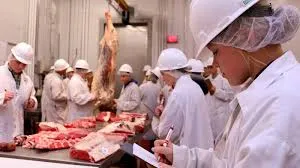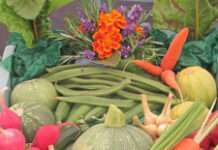K-State meat scientists studied three beef cuts to see how fat content, connective tissue characteristics and muscle structure influence tenderness
MANHATTAN, Kan. — There is nothing like biting into a nice juicy steak where the savory flavors burst in your mouth, but if that meat is tough to chew the experience may be a disappointment.
In the case of beef, all cuts are not created equal in terms of tenderness.
To learn more, Kansas State University meat scientists, with the support of beef checkoff funding, studied three cuts of beef looking at how fat content, muscle structure and aging influence tenderness.
“There is not a single biochemical trait (tenderness contribution factor) that can be used to predict tenderness for all beef cuts,” said Michael Chao, K-State meat science researcher and assistant professor in the Department of Animal Sciences and Industry.
The study focused on three cuts – the striploin (also known as New York Strip), tri-tip and heel.
“Tenderness is very much driven by the individual cut. For example, with the striploin overall tenderness is strongly influenced by lipid (fat) content, but heel overall tenderness is largely influenced by aging time,” Chao said.
With a better understanding of how each cut needs to be managed, the beef industry can pass along that information to consumers, said Chao.
For example, cuts with extensive muscle fiber shortening may be stretched while beef that has a poor aging response should not be aged, said Chao. He added that some cuts with high connective tissue need to be prepared with a moist-heat cooking method.
“It is more important than ever to find markers to assist the industry and consumers to determine the ideal tenderness management techniques to ensure a consistent eating quality of beef,” Chao said.
These research results are included in the proceedings for the virtual 2021 Cattlemen’s Day planned for March 5. To learn more, go to, www.asi.k-state.edu/cattlemensday.
FOR PRINT PUBLICATIONS: Links used in this story
2021 Cattlemen’s Day proceedings, www.asi.k-state.edu/cattlemensday.
K State Research and Extension is a short name for the Kansas State University Agricultural Experiment Station and Cooperative Extension Service, a program designed to generate and distribute useful knowledge for the well being of Kansans. Supported by county, state, federal and private funds, the program has county extension offices, experiment fields, area extension offices and regional research centers statewide. Its headquarters is on the K State campus in Manhattan. For more information, visit www.ksre.ksu.edu. K-State Research and Extension is an equal opportunity provider and employer.
Story by:
Lisa Moser
785-532-2010
lmoser@ksu.edu
More information:
Michael D. Chao
785-532-1230
mdchao@ksu.edu





